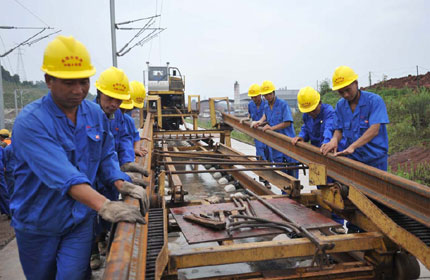Why statistics make poor tea leaves
Updated: 2014-07-04 08:09
By Ed Zhang (China Daily Europe)
|
|||||||||||
It takes more than GDP to visualize nation's future competitive fate
We're once again close hearing the country's report of its half-year macroeconomic results. But what can we expect to hear except the commitment to a few familiar indexes, first of all GDP growth?
Usually there is little difference, maybe one or two or three percentage points, to the previous report, unless there are more serious ups and downs that can be seen from the commercial street - such as burning inflation or sluggish sales.
A few percentage points of difference may be just what short-term investors want in order to make some small gains from small bets.
But there are those who would like to learn more - by making the extra effort of going to cities and talking to company managers here and there.
A field trip is almost a certainty for the premier before every major announcement, such as one about half-year or quarterly results. And on this field trip, more often than not, the premier calls for a meeting with local leaders from nearby provinces.
What is it, one might ask, that people are looking for in such field trips? The premier's trips are certainly not planned for just kissing babies and shaking hands with assembly line workers. Microeconomics, such as the performance of cities and companies, is not part of the premier's portfolio. But why does he feel obliged to travel so often?

The National Bureau of Statistics is adequate for providing his office in Beijing with all the figures about the country. So what else does he still want to hear about?
As it turns out, few general figures reveal any trends. The same index may represent quite different economies in different parts of the country.
In a country of ceaseless change, trends at times are by far the more important indicators. They point to where the money and other resources are going. But trends don't generate quick general statistics. They build up quietly, sometimes from obscure corners.
Pioneers of an economy's change are often small enterprises. And in this country, finding them can be as hard as locating a live cat at the site of a major earthquake. The government's provision of unjustified amounts of credit to large state-owned enterprises, started hurriedly immediately after the 2008 world financial crisis, simply squeezed many small enterprises out of business and generated rampant corruption among government-appointed ministry- or bureau-level executives in the SOEs.
The problem is that the overall economy still depends on small enterprises, led by private entrepreneurs, for its future innovations and competitiveness.
It's a basic quest of economics. Where is this competitiveness? Where can it survive? Where can it grow? And how can it grow faster so as to provide China with its much needed driving force for its intended technological progress and business transition? It's the duty of every responsible political leader to look for it, to learn about its present state, and to design ways to remove some of the bureaucratic hurdles in its way.
So touring China is not just a task for the premier. It is important for all who care about greater opportunities than just quick profit from some small bets.
From trips to various cities one can learn, as the premier must have, that not many officials really understand the basics of economics, despite all the large-ticket projects they boast about. And not many places are suitable for small enterprises to grow - unless there is a strong local culture to support entrepreneurship and resist bureaucratic excesses. So far, one can smell it only from the Yangtze and Pearl River deltas, where some of China's first-generation private enterprises still stand and many small ones still start up every year.
In central and western China there are no more than five cities that are able to accumulate the human resources needed for competitive private ventures.
It is not an exaggeration to say that only the cities where college graduates can easily build up their companies can serve as the future leaders of China's economy. For all the other cities, the premier can only urge them: Don't wait. Change.
The author is editor-at-large of China Daily. Contact the writer at edzhang@chinadaily.com.cn
(China Daily European Weekly 07/04/2014 page11)
Today's Top News
Gambling costs World Cup fans their lives
US supports Ukraine's decision to suspend ceasefire
It's all about making a spectacle
China likely to see 7.5% growth in second quarter
Palace Museum feeling the squeeze of visitors
Myanmar pagoda replica given to China
US sends 300 more troops to Iraq over concerns
Hong Kong at the crossroads
Hot Topics
Lunar probe , China growth forecasts, Emission rules get tougher, China seen through 'colored lens', International board,
Editor's Picks

|

|

|

|

|

|





